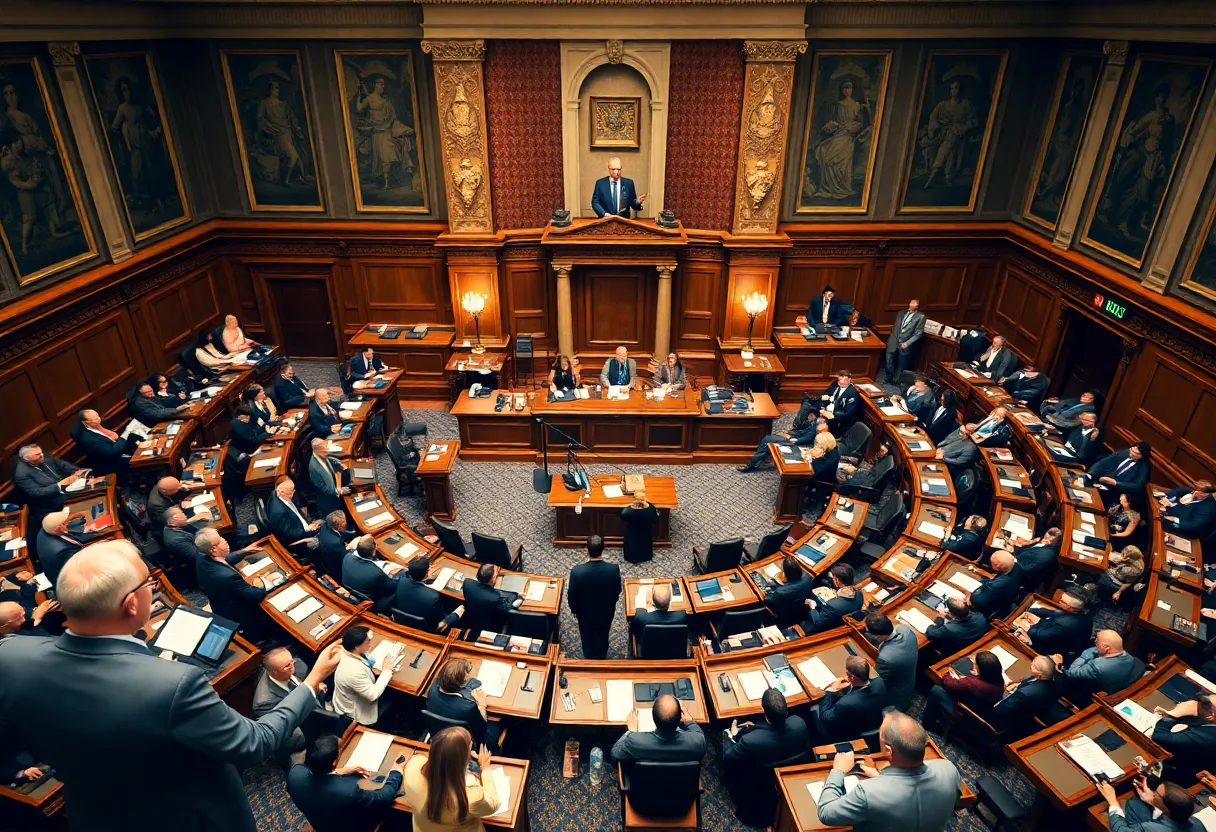News Summary
The New York State Legislature is finalizing budget bills for the upcoming fiscal year, with notable approvals including the Transportation, Economic Development and Environmental Conservation bill. The budget includes significant proposals for corrections, electoral processes, and public health, alongside transparency measures for various sectors. Ongoing discussions highlight the urgency of reform in correctional oversight and the electoral process in New York State, as lawmakers work towards effective resource allocation.
Albany, NY – The New York State Legislature is in the final stages of printing budget bills to complete the state’s spending plan for the upcoming fiscal year. As of early Wednesday, three out of nine budget bills have been introduced, addressing various sectors including Transportation, Economic Development and Environmental Conservation, Public Protection and General Government, and Health and Mental Hygiene.
On Wednesday afternoon, the Senate passed the Transportation, Economic Development and Environmental Conservation (TED) bill, marking the first budget policy bill to be approved in either chamber. The successful passage of this bill highlights ongoing efforts to advance the budget despite contentious discussions among lawmakers.
The recently introduced Public Protection and General Government (PPGG) bill notably excludes contentious language concerning changes to the discovery law, which had been a focal point of late budget negotiations. Furthermore, recent incidents, including the beating death of an inmate and a statewide strike by corrections officers, have highlighted the urgent need for increased oversight within correctional facilities across the state.
In response to staffing shortages, the new budget bill proposes lowering the minimum age for some corrections officers from 21 to 18 years. Additionally, the bill authorizes the closure of three prisons, a reduction from the initially proposed five. To improve transparency, funding is allocated for body-worn camera programs for corrections officers.
Significant changes have also been proposed regarding the electoral process for lieutenant governor candidates, who will now run on a ticket with the gubernatorial candidate in primaries. This represents a shift aimed at streamlining the election process in New York State. Moreover, amendments to public campaign finance rules will introduce changes to how matching funds for donations are applied, bringing New York’s system closer to that of New York City.
Another key aspect of the budget is the delay in enforcement of the law limiting outside income for legislators, with the new deadline set for 2027. This extension provides additional time for legal reviews and considerations regarding the implications of this law.
The proposed budget also includes an extension for the state Commission to Study Reparations and Racial Justice report, delaying its completion until January 30, 2027, allowing more time for comprehensive discussions on the topic.
The TED bill contains specific provisions impacting the cannabis industry, including that licensing fees will now be applied to cannabis businesses. There are also new guidelines regarding how pricing adjustments based on personal data are disclosed to consumers, aiming to enhance transparency and fairness.
In terms of public health, the Health and Mental Hygiene (HMH) bill introduces expanded criteria for involuntary commitment of individuals grappling with serious mental illness, now factoring in an individual’s ability to care for themselves. Additionally, it establishes that police should involve emergency medical services in transporting mentally ill individuals who are unable to care for themselves, rather than directly detaining them.
The budget also allocates significant increases in Medicaid funding for nursing homes and outpatient treatment services. Despite anticipated reductions in federal funding, the legislature aims to bolster support for these critical health services. Legislative language mandating that hospitals treat all patients, regardless of their financial status, has also been introduced, countering previous provisions that held hospitals liable for non-treatment.
Overall, discussions surrounding the budget have been characterized by delays and significant changes affecting various operational and procedural dimensions of state services. As lawmakers work to finalize the remaining budget bills, the focus remains on ensuring effective resource allocation and enhanced accountability in state operations.
Deeper Dive: News & Info About This Topic
HERE Resources
New York Faces Health Insurance Accessibility Challenges Amid Budget Cuts
Proposed Medicaid Cuts Threaten Small Businesses in New York
New York State Announces $2.2 Billion Tax Relief for Homeowners
Mamdani Proposes $100 Billion Housing Plan for NYC
Federal Funding Allocated to Enhance New York Airports
New York Plans Development of New Nuclear Power Plants
New York Plans First Advanced Nuclear Power Plant in a Decade
New York School Districts Adjust Schedules Due to Heat Wave
New York City Court Upholds Regulation of Nonpublic Schools
New York City Schools Expand Language Access for Families
Additional Resources
- CBS News: Senators Continue Debating Trump’s Budget Bill
- Wikipedia: New York State Budget
- The American Conservative: Senate GOP Advances Budget Bill
- Encyclopedia Britannica: Budget
- New York Times: Senate Republican Megabill
- Google Search: New York legislative budget process
- Spectrum Local News: Key Pieces of Legislation in Latest State Budget








